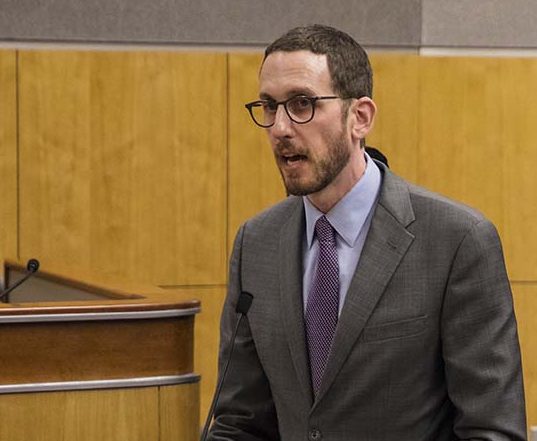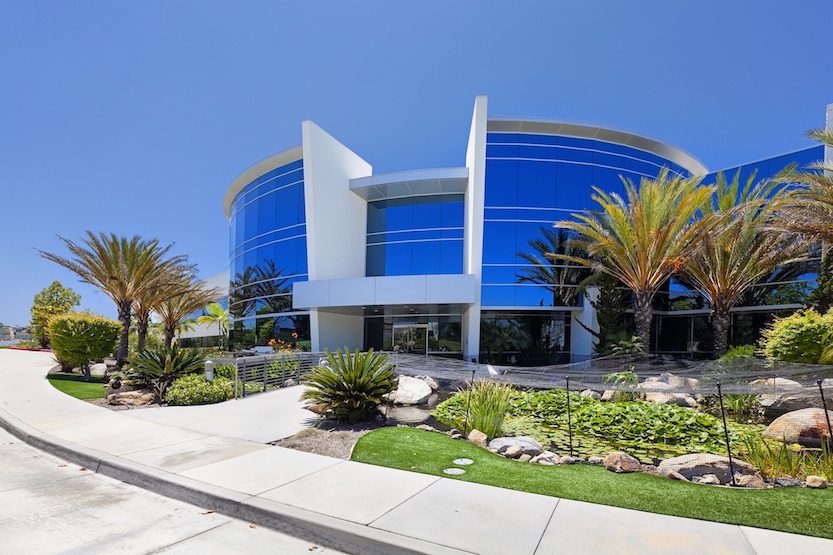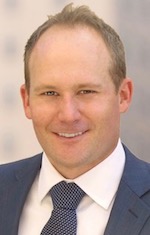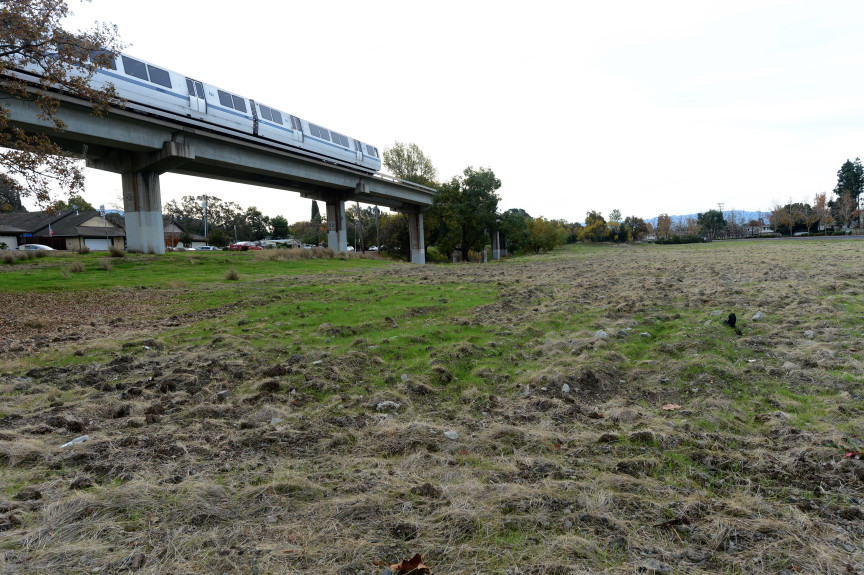Daily Business Report-Dec. 19, 2018
Land near public transit such as BART would be more easily developed into mid-rise apartment buildings under a proposal before California lawmakers. (Photo by Dan Honda, Bay Area News Group)
A gentler, still incredibly controversial
housing bill is back — with a powerful new ally
By Matt Levin | CALmatters
Last year, one piece of housing legislation overshadowed all others. Senate Bill 827 by Sen. Scott Wiener, Democrat from San Francisco, would have allowed developers to build four- to eight-story apartment buildings next to public transit stops around the state.
The goals were laudable: Ease regulations on the construction of desperately needed new housing (the state acknowledges it is short 3.5 million units), and reduce commuters’ greenhouse gas emissions by placing more homes near greener transportation such as subways, light rail and bus stops. The method was radical: Take away some of the zoning power of cities, which traditionally decide what types of homes can be built where and don’t typically encourage apartment buildings to be built right next door to single-family homes.
The instant controversy over the bill made national headlines. Beyond enraging homeowners in anti-growth locales such as Marin County, anti-gentrification groups complained the bill lacked sufficient protections for tenants in low-incomes communities where new high-rises often equate to rising rents.
So despite support from urbanists and environmentalists nationwide, the bill died a loud and early death. Wiener vowed he would be back with a similar plan next year, because he saw it as the only way to fix the state’s crushing housing shortage.
Well, it’s back. This week, Wiener and California YIMBY (“Yes In My Backyard,” a pro-development group mostly of younger Californians backed by tech money) unveiled SB 50.
“The heart of the bill is the same as where the bill ended up last year,” said Wiener. “This is about adding housing and not replacing existing tenants.”

Under the proposal, in most cases cities would no longer be able to block new apartment buildings within a half-mile of public transit. Developers also wouldn’t have to worry about minimum parking requirements, which otherwise could add costs and reduce the number of apartments in a building.
But changes in the new version of Wiener’s legislation have made it more palatable to some, and attracted new political allies. Certain communities that already created effective transit-oriented development plans would be exempt—which is why Los Angeles Mayor Eric Garcetti, a foe of last year’s bill, supports this one. Garcetti and various Los Angeles anti-gentrification groups feared last year’s bill would encroach on their own plans to bring more affordable housing to public transit. While singling out Garcetti’s program, details on what other local initiatives might be exempt from the SB 50 remain unknown.
While details remain in flux, the bill also includes a provision for more low-income housing and stricter protections for tenants, an attempt to mollify concerns from anti-gentrification groups who remain wary, but are not as explicitly opposed as they were last year.
“There was certainly more engagement prior to SB 50 than before SB 827, and we definitely appreciate that,” said Anya Lawler, a policy advocate for the Western Center on Law and Poverty, who testified against last year’s bill. Lawler’s organization is waiting to see how key affordable housing provisions are fleshed out in the coming months.
Perhaps most importantly, the bill has a powerful new ally—organized labor. The State Building and Construction Trades Council, which opposed Wiener’s bill last year, endorses the new legislation. The “trades” and their campaign coffers wield enormous clout in the Capitol, and were instrumental to passage of a 2017 housing bill package.
“The entire approach is different,” said Cesar Diaz, legislative and political director with the state construction workers’ union. “It’s a collaborative approach by a senator who brought us in to work on this early on.”
Why the about-face? Diaz says language in last year’s bill was too ambiguous about which types of projects could qualify for expedited city review. The new bill is clearer—most projects will still need to submit to an environmental review and conform to local labor standards, allowing construction workers’ unions to wield more influence in local project approval.
“Nothing in the bill will reduce labor’s ability to get wage protections,” said Wiener.
Even with the backing of organized labor, Wiener’s kinder, gentler “upzoning” bill still faces its own uphill climb. Sen. Jim Beall, current (although perhaps not future) chairman of the Senate housing committee, did not vote for last year’s bill. This week, he issued a press release that signaled he may be preparing an alternative to Wiener’s approach.
Most California cities—although not all—have loathed this approach because it strips their zoning power.
A new provision promoting denser development in higher-income communities seems particularly provocative. “Job rich” communities—a term Wiener has yet to fully define—would incentivize denser development even in areas not within a half mile of public transit. The provision aims to ensure that new apartment buildings won’t be built only in lower-income neighborhoods with lots of bus stops, but also in wealthier enclaves with lots of job opportunities but little public transit.
A remaining variable is Gov.-elect Gavin Newsom, who applauded Wiener’s ambition but was lukewarm on the details of last year’s legislation. A spokesman for Newsom declined to comment on the new bill.
_______________________
$100M round turns San Diego’s Seismic
into region’s newest unicorn
By Sarah de Crescenzo | Editor, Xconomy San Diego
Seismic, an enterprise software company with ambitious growth plans, has raised $100 million in a Series E financing and added Microsoft chairman John W. Thompson to its board of directors.
The venture investment, which the San Diego startup announced Tuesday, is one of only a few so-called mega-rounds—$100 million or more—recorded this year in the region. (In Southern California, rounds that large are more often raised by life sciences companies.)
_______________________

Vista industrial building
sells for over $24.7 million
A Vista industrial building fully leased by Captek Softgel International has been sold for just over $24.7 million to a global real estate investment firm, which was not named in the sale announcement. The seller was 2710 Progress Street LLC. The building is at 2710 Progress St.
Situated on 4.65 acres, 2710 Progress consists of office, lab, manufacturing and warehouse space. The building features a 28 foot clear-height, five shipping and receiving bays, a large truck court, and truck ingress and egress.
Cushman & Wakefield represented the seller.
_______________________
Minimum wage increasing to
$11 per hour beginning Jan. 1
On Jan. 1, 2019, the California minimum wage increases to $11 per hour for employers with 25 or fewer employees and to $12 per hour for employers with 26 or more employees. This is a result of SB 3 signed in 2016.
Also on Jan. 1, agricultural employers under Wage Order 14 with 26 or more employees will see the first in a series of phased-in overtime changes. Their agricultural workers, who have historically received time and a half only after 10 hours per day or 60 hours per week, will now receive it after 9.5 hours per day or 55 hours per week. Agricultural employers with 25 or fewer employees remain coverd by the old rules for now, but will begin phased-in overtime changes in 2022, as a result of the 2016 AB 1066.
_______________________
Swami’s Cafe Coming to Del Sur Town Center
Del Sur Town Center, the specialty dining and retail destination developed by Shea Properties in the master planned community of Black Mountain Ranch, announced Swami’s Cafe as the newest restaurant concept coming to the center in 2019. The Del Sur Town Center Swami’s Cafe will be its 12th location.
“Del Sur Town Center includes an exciting roster centered around food, fitness, services and shops, many who are local, San Diego-based brands,” said Kiril McKee, senior vice president of retail leasing at Shea Properties. “We’ve tried to bring together a mix of tenants that elevate the offerings for the community.”
Swami’s Cafe will join a diverse selection of restaurants at Del Sur Town Center, including Ponce’s Mexican Restaurant, a historic San Diego staple serving traditional Mexican food, and in January 2019 Luna Grill, the leading fast-casual Mediterranean restaurant founded in San Diego offering signature kabob plates, gourmet salads, appetizers including hummus and falafel, wraps and desserts.
_______________________
MiraCosta College offering new
engineering technology program
MiraCosta College has a new degree and certificate program in engineering technology aimed at providing students with the education and training needed to secure well-paying, middle-skilled jobs as engineering technicians in as little as a year. The goal of the Engineering Technology program at MiraCosta is to prepare a pipeline of graduates for a growing demand of engineering technicians in the region’s advanced manufacturing sector. San Diego County is home to several companies on the cutting edge of developing critical components in the aerospace, maritime, biomedical, beverage, and sports industries.
MiraCosta College’s Engineering Technology program will help fill a void—and at a much more affordable price—created when the federal Department of Education forced for-profit ITT Tech to shut down in September 2016.
_______________________
Ware Malcomb moves to larger office space
Ware Malcomb, an international design firm, announced a move into a new, larger office space located at 3911 Sorrento Valley Blvd, Suite 120 in San Diego. The move was driven by the growth of the firm’s local employee and client base. Ware Malcomb has 22 offices across North America, including a second local office at 600 B Street, Suite 2070 in Downtown San Diego.
Ware Malcomb’s new San Diego office incorporates the latest in interior design trends, as well as the firm’s own design standards.
_______________________
Port honors six sustainable
green business network members
Six businesses that operate on the Port of San Diego waterfront have been honored for their efforts toward ensuring the preservation of San Diego Bay and surrounding communities. During the 2018 Green Business Network Sustainable Achievement Award Ceremony held Dec. 7, CP Kelco San Diego, General Dynamics NASSCO, HII San Diego Shipyard Inc. (formerly Continental Maritime of San Diego), Hilton San Diego Airport/Harbor Island, Living Coast Discovery Center, and Sun Harbor Marina were all honored for their sustainable achievements.
The Port of San Diego launched the Green Business Network in 2010 for businesses located on Port tidelands as part of its work as the environmental champion of San Diego Bay. The voluntary program provides education to members on ways they can save money and reduce their environmental impact by prioritizing energy efficiency, clean transportation, water conservation, and waste reduction.
_______________________
USD professor receives $60,000
fellowship to benefit third book
Following a rigorous and highly competitive review process, the National Endowment for the Humanities (NEH) selected USD associate history professor Dr. Thomas Barton to receive a $60,000 fellowship, one of the largest NEH research grants ever received by USD’s College of Arts and Sciences.
The grant will fund a twelve-month research leave to support the completion of Dr. Barton’s third book, “From the Hands of the Infidels: The Christianization of Islamic Landscapes in Premodern Europe.”
The book seeks to enhance our understanding of European expansionism during the high and late Middle Ages by exploring how the invading Christians within Iberia, established their ecclesiastical institutions and networks on territories wrestled from Muslim control through the formation of dioceses, parishes, and monastic houses.
_______________________
Southcrest celebrates opening
of 51 affordable rental apartments
The transformation of a hillside in Southcrest into 51 affordable rental apartments was celebrated Tuesday with the grand opening of Vista del Puente, a San Diego Housing Commission (SDHC) partnership development.
Developed by National Community Renaissance (National CORE) and Townspeople, Vista del Puente will include on-site supportive services—such as mental health services, substance abuse recovery, job training and job placement assistance—for residents who previously experienced homelessness.
SDHC awarded 38 federal rental housing vouchers to provide rental assistance for Vista del Puente households that previously experienced homelessness and a $4.1 million loan toward the development.
_______________________
Cabrillo National Monument
to increase entrance fees Jan. 1, 2019
As part of its ongoing efforts to address aging park infrastructure and improve the visitor experience, Cabrillo National Monument announced an entrance fee increase beginning Jan. 1, 2019. The changes, which come in response to public comments on a fee proposal released in October 2017, resulted in a nationwide plan released on April 12, 2018. The plan will modestly increase entrance fees at national parks across the country to raise additional revenue to address the $11.6 billion in deferred maintenance across the system of 418 parks, historic and cultural sites, and monuments.
The vehicle entrance fee at Cabrillo, currently at $15 per vehicle, will rise to $20 per vehicle. The individual entrance fee will rise from $7 to $10, and the motorcycle fee will rise from $10 to $15.
Entrance fees will be waived on five days in 2019:
Monday, Jan. 21: Martin Luther King Jr. Day
Saturday, April 20: Start of National Park Week/National Junior Ranger Day
Sunday, Aug. 25: National Park Service Anniversary
Saturday, Sept. 28: National Public Lands Day
Monday, Nov. 11: Veterans Day
_______________________
Personnel Announcements
Finch, Thornton & Baird adds 2 associate attorneys


The California construction industry law firm of Finch, Thornton & Baird LLP announced the addition of two associate attorneys, Thomas E. Diamond and Cory P. DiBene.
Attorney Thomas E. Diamond practices in areas of construction law including claims and disputes, collections, as well as general business and commercial litigation. Diamond received his juris doctor from the University of San Diego School of Law, from which he graduated magna cum laude. He received his Bachelor of the Arts in Political Science from California State University, Chico.
Attorney Cory P. DiBene practices in the areas of construction law including contractor and subcontractor disputes, federal procurement and claims, and commercial real estate. Cory received his juris doctor from the University of San Diego School of Law, from which he graduated cum laude. He received his Bachelor of Science in Criminal Justice from San Diego State University, from which he also graduated cum laude.
_______________________
Blake Cavignac named growth and
development advisor for Cavignac & Associate

Blake Cavignac has been appointed growth & development adviser for Cavignac & Associates, announced Jeffrey W. Cavignac, president and managing principal of the Downtown San Diego-based risk management and insurance brokerage firm.
In his new role, Cavignac is charged with creating and executing internal programs designed to attract, develop and retain new agency producers and support staff to help the company achieve its ambitious growth goals in the coming years.
Cavignac brings to the firm 12 years of experience leading and developing college students and young professionals. He is president of YoungPro Elite, a company he founded in 2014 in Denver, Colo., that provides young professionals with career development programs and peer advisory groups to help propel them on their career path.
For two years prior to founding YoungPro Elite, Cavignac served as president of Intellectual Innovations in Fort Collins, Colo., which provides developmental tools and training programs to business leaders in companies of all sizes, from small businesses to Fortune 100 companies. Previously, he was president and founder of Be-Influential, also in Fort Collins, and chief operating officer of Formations, LLC, a commercial real estate company in Boulder, Colo.



